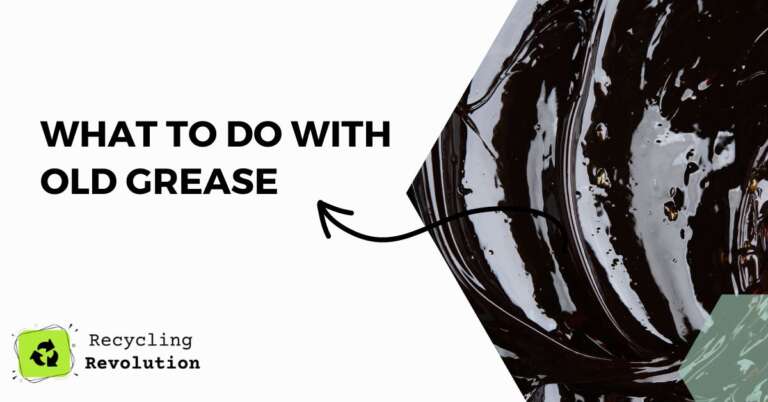As an experienced professional in waste management, I’ve often been asked, “What should I do with my old grease?” While the question seems straightforward, the answer isn’t as simple as you might think.
Grease, in its many forms, presents a unique set of challenges when it comes to disposal. It might be tempting to pour it down the drain or throw it in the bin, but these methods can cause environmental harm and are not recommended.
TL;DR: Old grease should never be poured down the drain or tossed in the trash. Instead, it should be collected, stored, and recycled or reused whenever possible.
Before we talk about what to do with old grease, it’s essential to understand what it is. Grease is a semi-solid substance primarily composed of fats, oils, and other organic compounds. It’s commonly used in cooking and machinery lubrication.
And improper disposal of grease can lead to environmental damage, with significant contributions to soil and water pollution.
A study published in the Journal of Environmental Management estimated that improper grease disposal contributes up to 47% of the 36 billion gallons of raw sewage overflows each year in the US.
Disposal of Grease: The Right Way
Here are some steps that outline how to handle old grease correctly:
- Cool and Collect: Allow the grease to cool and solidify in a container. It might be worthwhile to consider using a heat-resistant, non-recyclable container, like a tin can or an old plastic tub.
- Store: Seal the container securely and store it in a cool, dark place until it’s full.
- Dispose: Look for recycling programs in your local area that accept used grease. Alternatively, you can dispose of the filled container in the regular trash, which is far less harmful than pouring grease down the drain.
Repurpose the Grease
If the grease is relatively clean, it can often be reused. To do this:
- Let the grease cool a bit after cooking.
- Pour it through a cheesecloth or fine mesh strainer to remove any food particles.
- Store it in a clean, sealable container.
- Keep the container in a cool, dark place until you’re ready to use the grease again.
This method works particularly well with fats that solidify at room temperature, like bacon grease or beef tallow.
Solidify and Trash
If you don’t plan to reuse the grease, another option is to solidify it and then throw it away with your regular trash.
- Let the grease cool and solidify in the pan (or pour it into a disposable container and let it solidify there).
- Once it’s solid, use a spatula to scrape the grease into your trash can.
- Wipe out any remaining grease with a paper towel before washing your pan.
Use Absorbent Materials
For liquid oils that don’t solidify, you can mix them with an absorbent material to make disposal easier. Cat litter, sand, and sawdust can all be used for this purpose. Once the oil is absorbed, you can dispose of it with your regular trash.
Recycle
In many areas, used cooking oil can be recycled and turned into biodiesel. Many cities have drop-off locations where you can bring used cooking oil, or there may be pickup services available.
- Pour the cooled grease into a plastic container with a tight-fitting lid.
- Take the container to a recycling drop-off location.
- Never mix cooking oil with motor oil or other automotive fluids. They need to be recycled separately.
Reusing Grease: The Eco-friendly Alternative
A useful suggestion would be to repurpose old grease instead of disposing of it. Here are some ingenious ways to reuse grease:
- Cooking: Filtered grease can be reused for cooking several times.
- Composting: Small amounts of vegetable-based grease can be added to compost heaps or bins, enriching the compost with vital nutrients.
- Bird Feeding: Old grease, especially bacon grease, can be mixed with bird seeds to make winter cakes for your feathered friends.
Turning Waste into Wealth
Recycling grease is a relatively new but promising solution. According to the American Biofuels Association, used cooking oil can be converted into biodiesel, a cleaner-burning alternative to traditional petroleum diesel.
Grease Disposal: Impact on the Environment
The improper disposal of grease has a substantial environmental impact. When dumped into drains, it hardens and blocks sewage pipes, causing wastewater overflows that contaminate our water bodies.
In fact, according to the U.S. Environmental Protection Agency, grease blockages are the primary cause of sewage overflows, accounting for 47% of all reported cases.
Community Initiatives and Programs
Many cities and communities run grease recycling programs, particularly around the holidays when cooking—and grease production—is at its peak.
Check with your local waste disposal service or community recycling program for information on drop-off locations or pick-up services.
Conclusion
In conclusion, old grease management requires our careful attention. Remember, it is not just about keeping our kitchens clean but also about safeguarding our environment. We all have a part to play in ensuring that old grease is disposed of or repurposed in a responsible, eco-friendly manner.
FAQs
Can I pour old grease down the sink?
No. As we’ve previously noted, pouring grease down the sink can lead to clogged pipes and damage to sewer systems.
Can I mix old grease with compost?
Yes, but only in small amounts. Remember that it should be plant-based grease and used sparingly to prevent an imbalance in your compost heap’s nutrient content.
Can old grease be recycled?
Absolutely. Many recycling centers now accept used grease, which can be converted into biofuel.

